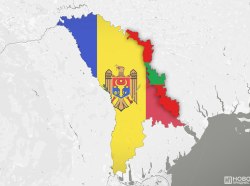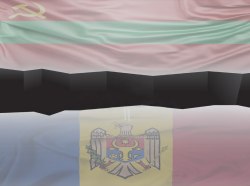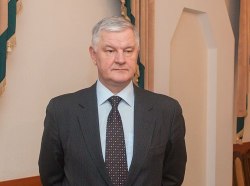Tiraspol, 23 April. /Novosti Pridnestrovya/. New restrictive actions of Moldova can directly affect the living standards of Pridnestrovian citizens, as well as damage the economic agents of Ukraine. The reasons and consequences of this politically motivated decision were discussed on First Pridnestrovian TV by special presedential representative on Ukraine Vladimir Yastrebchak and head of the Supreme Vouncil committee on entrepreneurdhip and industry Viktor Guzun.
According to the parliamentarian, the joint actions of Chisinau and Kiev aimed first at establishing a joint customs post on the Pridnestrovian-Ukrainian border and then at ratifying the control of Pridnestrovian imports by Moldovan security forces are part of a single plan to strengthen the blockade of Pridnestrovie, which is being implemented gradually and in stages.
"The tactics chosen by our neighbours is the gradual strangulation of our country. A small step is taken; the reaction is looked at; the next step is taken, which is more painful than the previous one, and then one more step. This is a systematic work aimed at regularly tightening the ring around Pridnestrovie," said Viktor Guzun.
At the same time, the MP notes that as a result of such actions, both the country's entrepreneurs and ordinary citizens may suffer.
"Initially, it was said that these posts would perform some accounting function; now payments are collected; the following steps can be aimed at fully implementing all the fiscal operations that Moldovan customs officers can perform on the territory of Ukraine. This will increaase the cost of goods supplied to the PMR, because the costs incurred by importers will be included in the final cost of production, and eventually it is the consumers who will pay for all this," said Guzun.
At the same time, the restrictive measures can also damage the Ukrainian economic agents who trade with Pridnestrovie, Vladimir Yastrebchak adds. As the ex-foreign minister recalls, after Ukraine imposed a ban on the export of Pridnestrovian goods without their registration in Moldova in 2006, only transport enterprise Ukrzaliznytsa suffered millions of losses. First of all, border trade between Ukraine and Pridnestrovie may suffer from new restrictive measures, the experts predict. In particular, Pridnestrovian individual entrepreneurs can switch to purchasing goods in Moldova, and not in Ukraine, since in this case they will not need to undergo the control of the Moldovan customs.
According to Viktor Guzun, Ukrainian politicians understand that, bowing to the wishes of Moldova, they are harming hundreds of thousands of their own citizens residing in Pridnestrovie. However, the desire to spite not even Pridnestrovie but Russia outweighs common sense.
"It's no secret that we consider ourselves part of the Russian world; we have flags of the Russian Federation over state buildings. There is a struggle between two geopolitical players, which are Russia and Ukraine, and small countries can become a victim of this struggle," said Guzun.
Vladimir Yastrebchak also says that the ratification of the joint control agreement by Ukraine's Verkhovna Rada was caused primarily by political motives. The ex-minister recalls that the vote on this issue failed six times, and only after the seventh attempt was the law passed. At the same time, when presenting the document to the Rada, it was not concealed that its adoption "must support Moldova during the parliamentary elections".
"There is nothing common with the legal side of the issue. The legal aspects play the role of a screen here, but in fact, the leading role is played by political expediency, which is very much misinterpreted," said the diplomat.
In these conditions, it is important for Prudnestrovie not to remain silent but to inform the mediators and observers in the negotiation process about the negative consequences of the joint actions of Kiev and Chisinau.
"The fact that our delegation is in Moscow is also a form of response so that there are no illusions that we will remain alone," the diplomat maintained.
Last week Moldovan customs officers began to control goods going to Pridnestrovie through the border crossing point Kuchurgan. Importers are required to fill out Moldovan declarations while charging fees for customs broker services. There were problems with the import of medicines. The customs officials refused to admit pharmaceuticals because they were not certified in Moldova, without taking into account that they were authorized for use in Pridnestrovie. As a result, the cargo was admitted through the border "as an exception."








